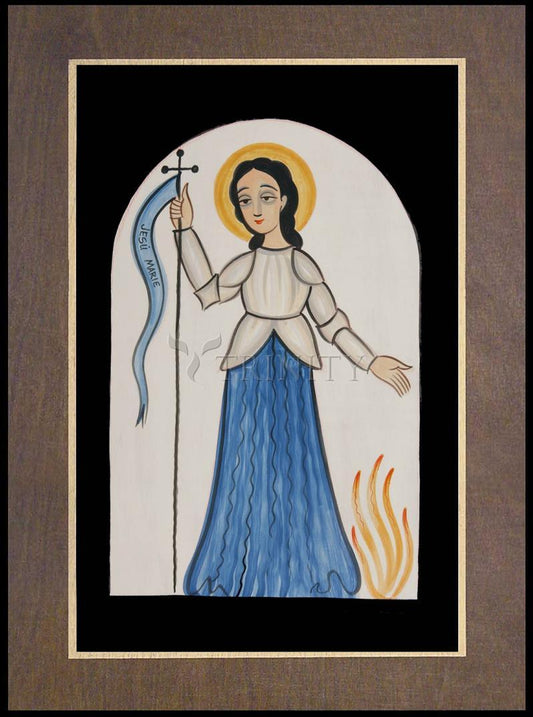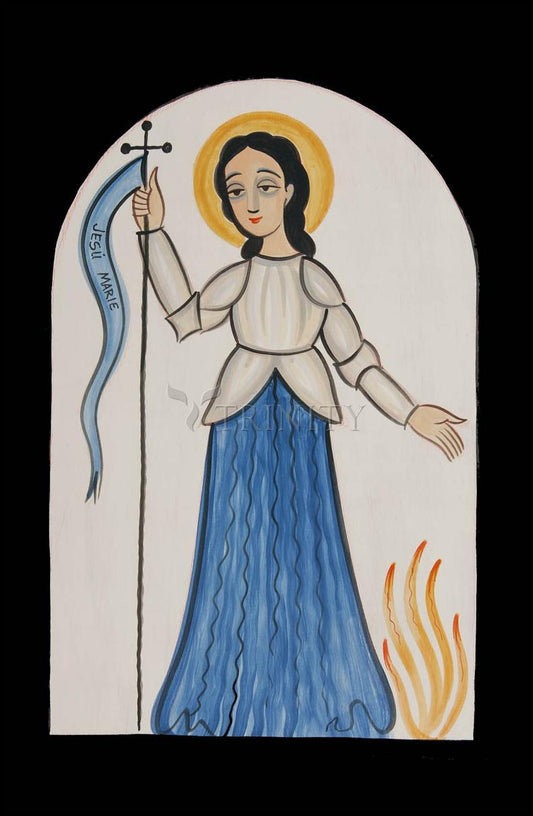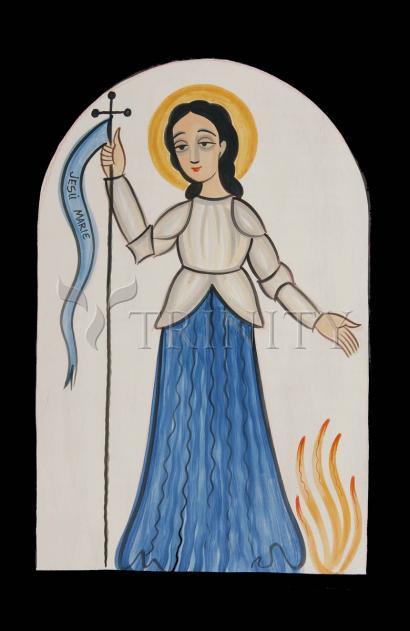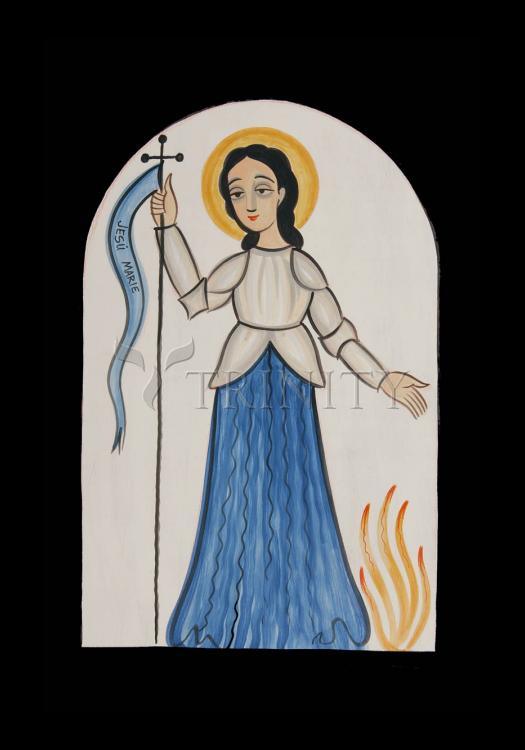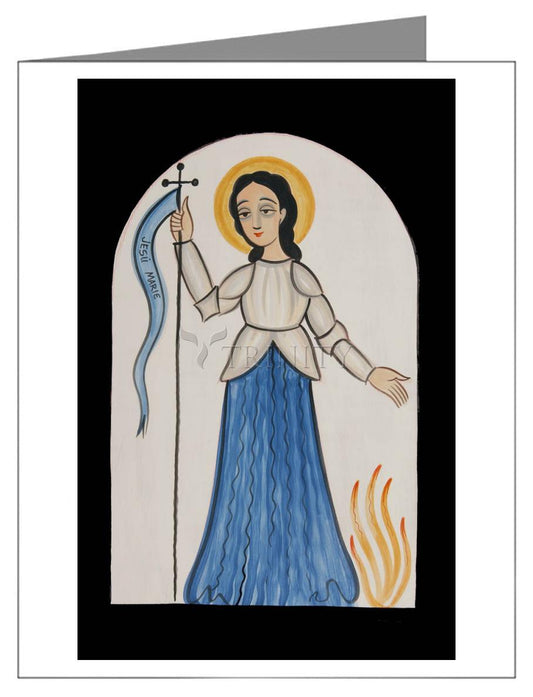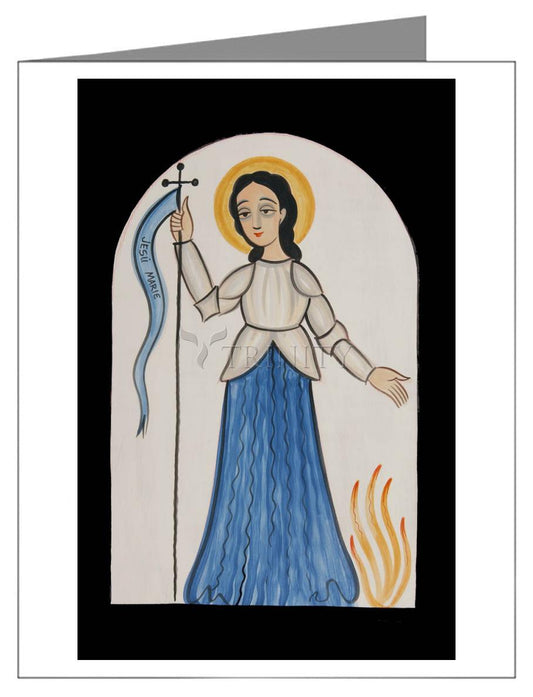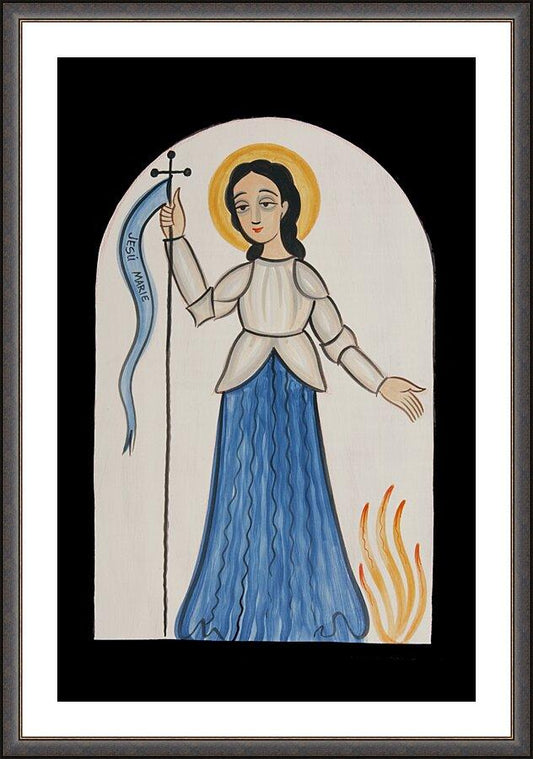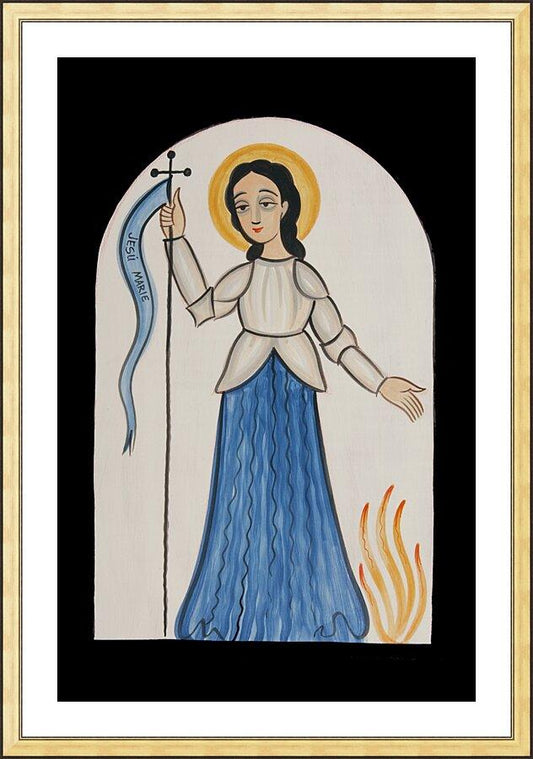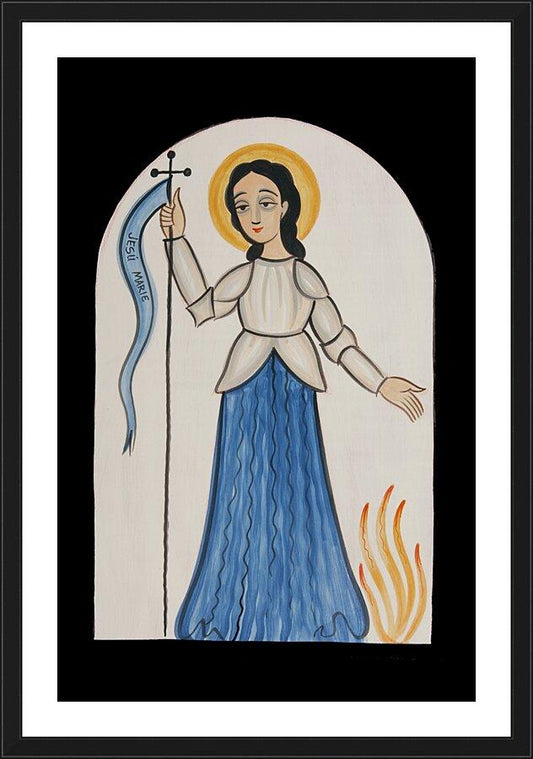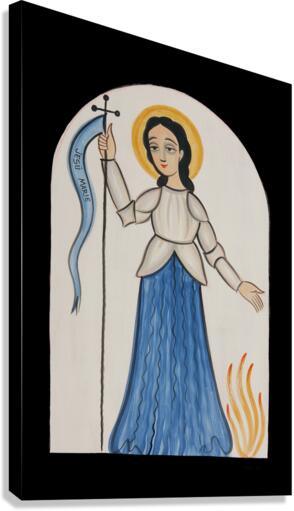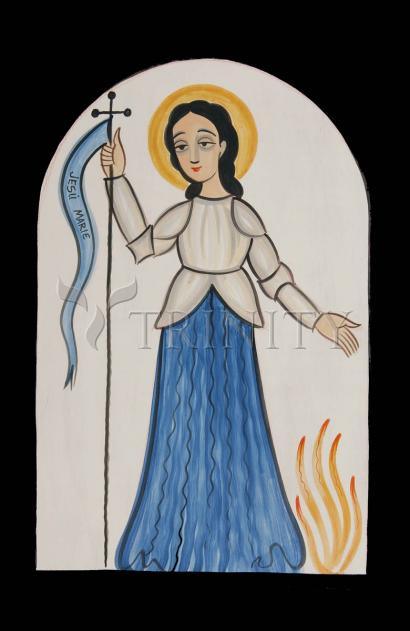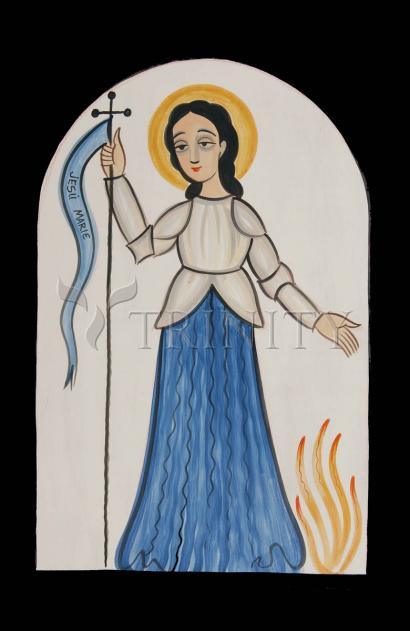Joan was born at Domremy in Champagne on 6 January, 1412.She died at Rouen, 30 May, 1431. The village of Domremy lay upon the confines of territory which recognized the suzerainty of the Duke of Burgundy, but in the protracted conflict between the Armagnacs (the party of Charles VII, King of France), on the one hand, and the Burgundians in alliance with the English, on the other, Domremy had always remained loyal to Charles.
Jacques d'Arc, Joan's father, was a small peasant farmer, poor but not needy. Joan seems to have been the youngest of a family of five. She never learned to read or write but was skilled in sewing and spinning, and the popular idea that she spent the days of her childhood in the pastures, alone with the sheep and cattle, is quite unfounded. All the witnesses in the process of rehabilitation spoke of her as a singularly pious child, grave beyond her years, who often knelt in the church absorbed in prayer, and loved the poor tenderly. Great attempts were made at Joan's trial to connect her with some superstitious practices supposed to have been performed round a certain tree, popularly known as the "Fairy Tree" (l'Arbre des Dames), but the sincerity of her answers baffled her judges. She had sung and danced there with the other children, and had woven wreaths for Our Lady's statue, but since she was twelve years old she had held aloof from such diversions.
It was at the age of thirteen and a half, in the summer of 1425, that Joan first became conscious of that manifestation, whose supernatural character it would now be rash to question, which she afterwards came to call her "voices" or her "counsel." It was at first simply a voice, as if someone had spoken quite close to her, but it seems also clear that a blaze of light accompanied it, and that later on she clearly discerned in some way the appearance of those who spoke to her, recognizing them individually as St. Michael (who was accompanied by other angels), St. Margaret, St. Catherine, and others. Joan was always reluctant to speak of her voices. She said nothing about them to her confessor, and constantly refused, at her trial, to be inveigled into descriptions of the appearance of the saints and to explain how she recognized them. None the less, she told her judges: "I saw them with these very eyes, as well as I see you."
Great efforts have been made by rationalistic historians, such as M. Anatole France, to explain these voices as the result of a condition of religious and hysterical exaltation which had been fostered in Joan by priestly influence, combined with certain prophecies current in the countryside of a maiden from the bois chesnu (oak wood), near which the Fairy Tree was situated, who was to save France by a miracle. But the baselessness of this analysis of the phenomena has been fully exposed by many non-Catholic writers. There is not a shadow of evidence to support this theory of priestly advisers coaching Joan in a part, but much which contradicts it. Moreover, unless we accuse the Maid of deliberate falsehood, which no one is prepared to do, it was the voices which created the state of patriotic exaltation, and not the exaltation which preceded the voices. Her evidence on these points is clear.
Although Joan never made any statement as to the date at which the voices revealed her mission, it seems certain that the call of God was only made known to her gradually. But by May, 1428, she no longer doubted that she was bidden to go to the help of the king, and the voices became insistent, urging her to present herself to Robert Baudricourt, who commanded for Charles VII in the neighboring town of Vaucouleurs. This journey she eventually accomplished a month later, but Baudricourt, a rude and dissolute soldier, treated her and her mission with scant respect, saying to the cousin who accompanied her: "Take her home to her father and give her a good whipping."
Meanwhile the military situation of King Charles and his supporters was growing more desperate. Orleans was invested (12 October, 1428), and by the close of the year complete defeat seemed imminent. Joan's voices became urgent, and even threatening. It was in vain that she resisted, saying to them: "I am a poor girl; I do not know how to ride or fight." The voices only reiterated: "It is God who commands it." Yielding at last, she left Domremy in January, 1429, and again visited Vaucouleurs.
Baudricourt was still skeptical, but, as she stayed on in the town, her persistence gradually made an impression on him. On 17 February she announced a great defeat which had befallen the French arms outside Orleans (the Battle of the Herrings). As this statement was officially confirmed a few days later, her cause gained ground. Finally she was offered to seek the king at Chinon, and she made her way there with a slender escort of three men-at-arms, she being attired, at her own request, in male costume -- undoubtedly as a protection to her modesty in the rough life of the camp. She always slept fully dressed, and all those who were intimate with her declared that there was something about her which repressed every unseemly thought in her regard.
She reached Chinon on 6 March, and two days later was admitted into the presence of Charles VII. To test her, the king had disguised himself, but she at once saluted him without hesitation amidst a group of attendants. From the beginning a strong party at the court -- La Tremoille, the royal favorite, foremost among them -- opposed her as a crazy visionary, but a secret sign, communicated to her by her voices, which she made known to Charles, led the king, somewhat half-heartedly, to believe in her mission. What this sign was, Joan never revealed, but it is now most commonly believed that this "secret of the king" was a doubt Charles had conceived of the legitimacy of his birth, and which Joan had been supernaturally authorized to set at rest.
Still, before Joan could be employed in military operations she was sent to Poitiers to be examined by a numerous committee of learned bishops and doctors. The examination was of the most searching and formal character. It is regrettable in the extreme that the minutes of the proceedings, to which Joan frequently appealed later on at her trial, have altogether perished. All that we know is that her ardent faith, simplicity, and honesty made a favorable impression. The theologians found nothing heretical in her claims to supernatural guidance, and, without pronouncing upon the reality of her mission, they thought that she might be safely employed and further tested.
Returning to Chinon, Joan made her preparations for the campaign. Instead of the sword the king offered her, she begged that search might be made for an ancient sword buried, as she averred, behind the altar in the chapel of Ste-Catherine-de-Fierbois. It was found in the very spot her voices indicated. There was made for her at the same time a standard bearing the words Jesus, Maria, with a picture of God the Father, and kneeling angels presenting a fleur-de-lis.
But perhaps the most interesting fact connected with this early stage of her mission is a letter of one Sire de Rotslaer written from Lyons on 22 April, 1429, which was delivered at Brussels and duly registered, as the manuscript to this day attests, before any of the events referred to received their fulfillment. The Maid, he reports, said "that she would save Orleans and would compel the English to raise the siege, that she herself in a battle before Orleans would be wounded by a shaft but would not die of it, and that the King, in the course of the coming summer, would be crowned at Reims, together with other things which the King keeps secret."
Before entering upon her campaign, Joan summoned the King of England to withdraw his troops from French soil. The English commanders were furious at the audacity of the demand, but Joan by a rapid movement entered Orleans on 30 April. Her presence there at once worked wonders. By 8 May the English forts which encircled the city had all been captured, and the siege raised, though on the 7th Joan was wounded in the breast by an arrow. So far as the Maid went she wished to follow up these successes with all speed, partly from a sound warlike instinct, partly because her voices had already told her that she had only a year to last. But the king and his advisers, especially La Tremoille and the Archbishop of Reims, were slow to move.
However, at Joan's earnest entreaty a short campaign was begun upon the Loire, which, after a series of successes, ended on 18 June with a great victory at Patay, where the English reinforcements sent from Paris under Sir John Fastolf were completely routed. The way to Reims was now practically open, but the Maid had the greatest difficulty in persuading the commanders not to retire before Troyes, which was at first closed against them. They captured the town and then, still reluctantly, followed her to Reims, where, on Sunday, 17 July, 1429, Charles VII was solemnly crowned, the Maid standing by with her standard, for -- as she explained -- "as it had shared in the toil, it was just that it should share in the victory."
The principal aim of Joan's mission was thus attained, and some authorities assert that it was now her wish to return home, but that she was detained with the army against her will. The evidence is to some extent conflicting, and it is probable that Joan herself did not always speak in the same tone. Probably she saw clearly how much might have been done to bring about the speedy expulsion of the English from French soil, but on the other hand she was constantly oppressed by the apathy of the king and his advisers, and by the suicidal policy which snatched at every diplomatic bait thrown out by the Duke of Burgundy.
"About Jesus Christ and the Church, I simply know they're just one thing, and we shouldn't complicate the matter."
—Saint Joan of Arc, as recorded at her trial
Born: January 6, 1412 at Greux-Domremy, Lorraine, France
Died: Burned alive on May 30, 1431 at Rouen, France
Beatified: April 11, 1905 by Pope Saint Pius X
Canonized: May 16, 1920 by Pope Benedict XV
Name Meaning: God is gracious



